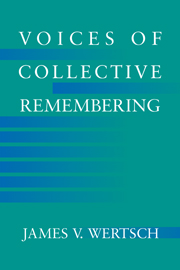Book contents
- Frontmatter
- Contents
- Introduction and Acknowledgments
- 1 An Encounter with Collective Memory
- 2 Methodological Preliminaries to the Study of Collective Remembering
- 3 Collective Memory: A Term in Search of a Meaning
- 4 State Production of Official Historical Narratives
- 5 Narrative Dialogicality and Narrative Templates in the Production of Official Collective Memory
- 6 The Consumption of Historical Narratives
- 7 Generational Differences in Collective Remembering
- Conclusion
- References
- Index
4 - State Production of Official Historical Narratives
Published online by Cambridge University Press: 08 January 2010
- Frontmatter
- Contents
- Introduction and Acknowledgments
- 1 An Encounter with Collective Memory
- 2 Methodological Preliminaries to the Study of Collective Remembering
- 3 Collective Memory: A Term in Search of a Meaning
- 4 State Production of Official Historical Narratives
- 5 Narrative Dialogicality and Narrative Templates in the Production of Official Collective Memory
- 6 The Consumption of Historical Narratives
- 7 Generational Differences in Collective Remembering
- Conclusion
- References
- Index
Summary
Maurice Halbwachs took as his starting point the idea that human memory presupposes a social framework. In this chapter, I shall be concerned with the inverse claim – that social groups presuppose memory. By this I mean that collective remembering typically provides an essential basis for the creation and maintenance of groups – specifically, imagined communities. In what follows, I shall examine how a particular type of collective – the modern state – pursues this agenda by providing its citizens with official accounts of the past. My line of reasoning begins with the notion of distributed collective memory outlined in Chapter 2. From this perspective, remembering is an active process involving agents and cultural tools, especially narrative texts. Modern states have implicitly recognized the two basic elements in this form of mediated action in that they have sought to control both the textual resources involved in remembering and the particular uses made of them. When successful, the result may be the kind of transparent textual mediation that characterized Sasha's account ofWorld War II outlined in Chapter 1. But even when citizens are more reflective about the forms of textual mediation they employ, states are often successful in controlling their uses of narratives about the past.
In what follows, I shall be concerned with issues such as the peculiarities of the state as a promulgator of collective remembering and the role of formal education in this effort. In the process, I shall also revisit the distinction between history and collective memory. Much of what I have to say involves going into the particular case of the Soviet Union, a context in which state control over the production and use of textual resources took on extreme form.
- Type
- Chapter
- Information
- Voices of Collective Remembering , pp. 67 - 86Publisher: Cambridge University PressPrint publication year: 2002
- 1
- Cited by



